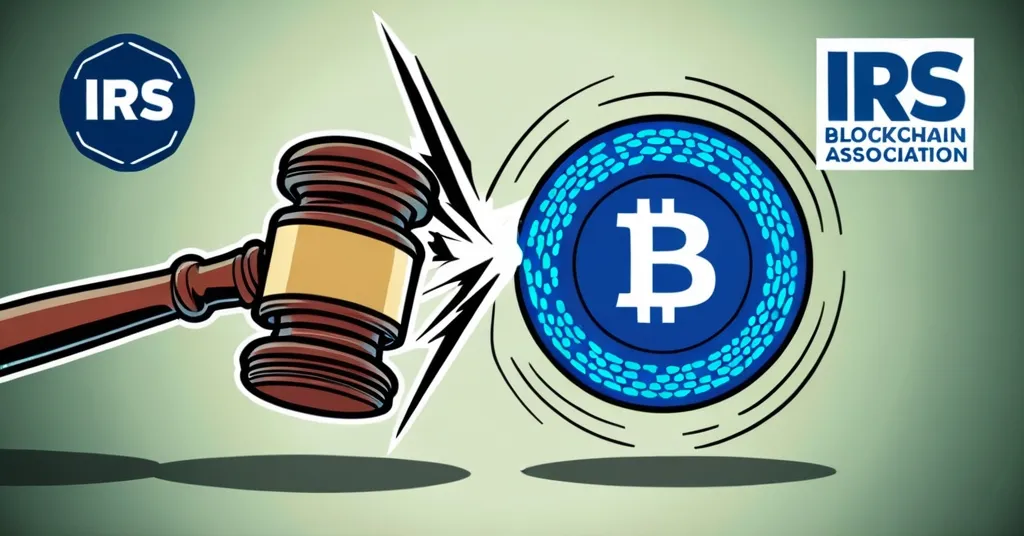Blockchain Association Sues IRS Over DeFi Broker Rules, Sparks Privacy Debate

Blockchain Association Challenges IRS Over Crypto Broker Rules
The battle for the soul of decentralized finance (DeFi) has reached a boiling point as the Blockchain Association and the Texas Blockchain Council take on the IRS in a lawsuit that could redefine the future of crypto. These new regulations, set to take effect in 2027, expand the definition of “broker” to include decentralized exchanges (DEXs) and DeFi platforms, sparking a fierce debate over privacy, compliance, and innovation.
- IRS targets DeFi with new regulations
- Lawsuit filed over privacy and compliance
- Potential impact on innovation and privacy
The IRS’s final regulations, issued on December 27, mandate that brokers report gross proceeds and taxpayer information from digital asset transactions. This move, part of the Infrastructure Investment and Jobs Act (IIJA), aims to increase tax compliance in the digital asset space. However, it has drawn ire from the blockchain community. The Blockchain Association argues that these rules violate the Administrative Procedure Act—a U.S. law that ensures government agencies follow fair procedures when creating rules—and are unconstitutional, imposing undue compliance burdens on software developers and infringing on the privacy rights of DeFi users.
Kristin Smith, CEO of the Blockchain Association, stated,
“Today we’re taking action, filing a lawsuit that argues today’s broker rulemaking violates the Administrative Procedure Act and is unconstitutional.”
Her sentiment is echoed by Marisa Coppel, Head of Legal at the Blockchain Association, who added,
“Not only is this an infringement on the privacy rights of individuals using decentralized technology, it would push this entire, burgeoning technology offshore.”
The lawsuit, filed on December 28, highlights the tension between regulatory ambitions and the decentralized ethos of blockchain technology. The IRS estimates that between 650 and 875 DeFi brokers and up to 2.6 million US taxpayers will be affected by these regulations. Critics argue that such rules could stifle innovation, as developers and platforms might seek more favorable environments offshore.
Imagine if your bank had to report every single transaction you make, even the smallest coffee purchase, to the government. That’s the level of oversight the new IRS rules could impose on DeFi users. DeFi, or Decentralized Finance, refers to financial services built on blockchain technology, allowing for direct peer-to-peer transactions without traditional intermediaries. DEXs, or Decentralized Exchanges, are platforms where users can trade cryptocurrencies directly with one another. While the road ahead may be fraught with challenges, the Blockchain Association’s fight could pave the way for a more decentralized future.
Despite the challenges, the Blockchain Association remains committed to fostering innovation within the US. Smith affirmed,
“We stand with our nation’s innovators and will continue working to ensure the future of crypto—and DeFi—is here in the United States.”
This lawsuit is a clear signal that the battle lines are drawn, with significant implications for the future of decentralized finance.
If you thought your crypto transactions were private, the IRS might be about to crash the party with their new rules. As the crypto landscape continues to evolve, this legal challenge could be a pivotal moment. It raises questions about the balance between regulatory oversight and the freedom to innovate, particularly in a sector that prides itself on decentralization and privacy. The outcome of this lawsuit could set a precedent for how cryptocurrencies and DeFi platforms are regulated moving forward.
While the IRS’s regulations aim to increase transparency and tax compliance, they may also inadvertently push innovation offshore. A recent survey showed that 70% of DeFi developers are considering moving operations offshore due to regulatory uncertainty. This raises concerns about the U.S. potentially losing its edge in the rapidly growing DeFi sector.
On the other hand, the IRS argues that these regulations will help ensure all taxpayers play by the same rules and have access to necessary information for accurate tax filing. Aviva Aron-Dine, Performing the Duties of Assistant Secretary for Tax, stated that the rules are intended to facilitate tax compliance without imposing new tax obligations on digital asset holders.
Internationally, other countries are taking different approaches to regulating DeFi. For instance, some nations are exploring regulatory sandboxes to foster innovation while ensuring consumer protection. This global perspective highlights the potential consequences of the U.S. regulations driving DeFi innovation abroad.
Technically, implementing these regulations on decentralized platforms poses significant challenges. Collecting and reporting data from non-custodial transactions, where users retain control of their assets, could be complex and potentially infeasible without compromising the decentralized nature of the technology.
Key Questions and Takeaways
- What are the new IRS regulations on digital asset transactions?
The IRS issued regulations requiring brokers, including decentralized exchanges (DEXs) and DeFi platforms, to report gross proceeds and taxpayer information from digital asset transactions, effective from 2027.
- Why did the Blockchain Association file a lawsuit against the IRS?
The Blockchain Association argues that the IRS’s new broker rules violate the Administrative Procedure Act, are unconstitutional, impose unlawful compliance burdens on software developers, and infringe on the privacy rights of DeFi users.
- How might these regulations impact the DeFi sector?
The regulations could impose significant compliance burdens on DeFi platforms, potentially driving innovation offshore and infringing on the privacy rights of DeFi users.
- What is the potential impact on software developers in the blockchain space?
Software developers might face increased legal and compliance burdens, as highlighted by the case of Alex Pertsev and the broader implications of the IRS rules on front-end trading infrastructure.
- Are there any privacy concerns associated with the IRS’s new rules?
Yes, legal experts argue that the new rules infringe on the privacy rights of individuals using decentralized technology, as they require brokers to report detailed transaction data.
As the legal battle unfolds, the outcome of this lawsuit could shape the future of crypto regulation, balancing the scales between innovation and oversight. Stay tuned as we continue to cover this critical battle between the Blockchain Association and the IRS.



